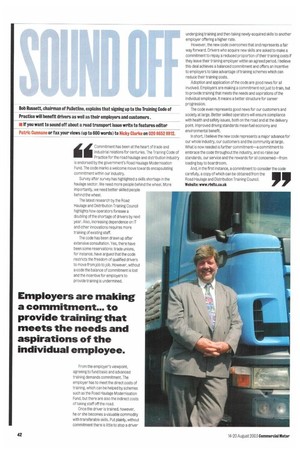i Commitment has been at the heart of trade and
Page 42

If you've noticed an error in this article please click here to report it so we can fix it.
industrial relations for centuries, The Training Code of Practice for the road haulage and distribution industry is endorsed by the government's Road Haulage Modernisation Fund. The code marks a welcome move towards encapsulating commitment within our industry.
Survey after survey has highlighted a skills shortage in the haulage sector. We need more people behind the wheel. More importantly, we need better skilled people behind the wheel.
The latest research by the Road Haulage and Distribution Training Council highlights how operators foresee a doubling of the shortage of drivers by next year. Also, increasing dependence on IT and other innovations requires more training of existing staff.
The code has been drawn up after extensive consultation. Yes, there have been some reservations: trade unions, for instance, have argued that the code restricts the freedom of qualified drivers to move from job to job. However, without a code the balance of commitment is lost and the incentive for employers to provide training is undermined.
From the employer's viewpoint, agreeing to fund basic and advanced training demands commitment. The employer has to meet the direct costs of training, which can be helped by schemes such as the Road Haulage Modernisation Fund, but there are also the indirect costs of taking staff off the road.
Once the driver is trained, however, he or she becomes a valuable commodity with transferable skills. Put plainly, without commitment there is little to stop a driver undergoing training and then taking newly-acquired skills to another employer offering a higher rate.
However, the new code overcomes that and represents a fair way forward. Drivers who acquire new skills are asked to make a commitment to repay a reduced proportion of their training costs if they leave their training employer within an agreed period. I believe this deal achieves a balanced commitment and offers an incentive to employers to take advantage of training schemes which can reduce their training costs.
Adoption and application of the code are good news for all involved. Employers are making a commitment not just to train, but to provide training that meets the needs and aspirations of the individual employee. It means a better structure for career progression.
The code even represents good news for our customers and society at large. Better skilled operators will ensure compliance with health and safety issues, both on the road and at the delivery point. improved driving standards mean fuel economy and environmental benefit.
In short, I believe the new code represents a major advance for our whole industry, our customers and the community at large. What is now needed is further commitment—a commitment to embrace the code throughout the industry, and so raise our standards, our service and the rewards for all concerned—from loading bay to boardroom.
And, in the first instance, a commitment to consider the code carefully, a copy of which can be obtained from the Road Haulage and Distribution Training Council. Wettsite: www-rlidtc.co.uk
































































































































































